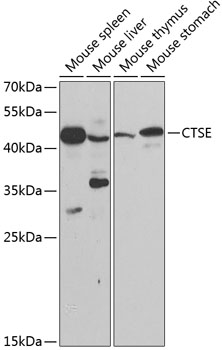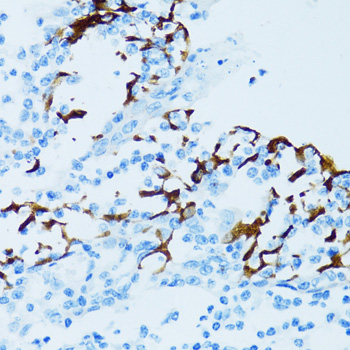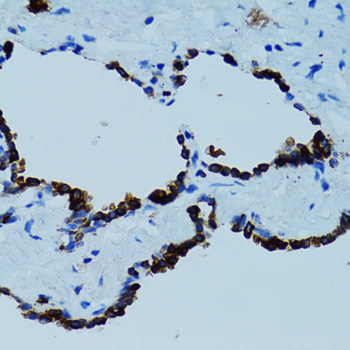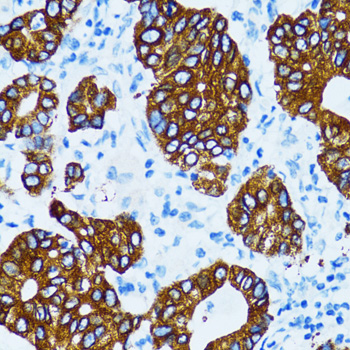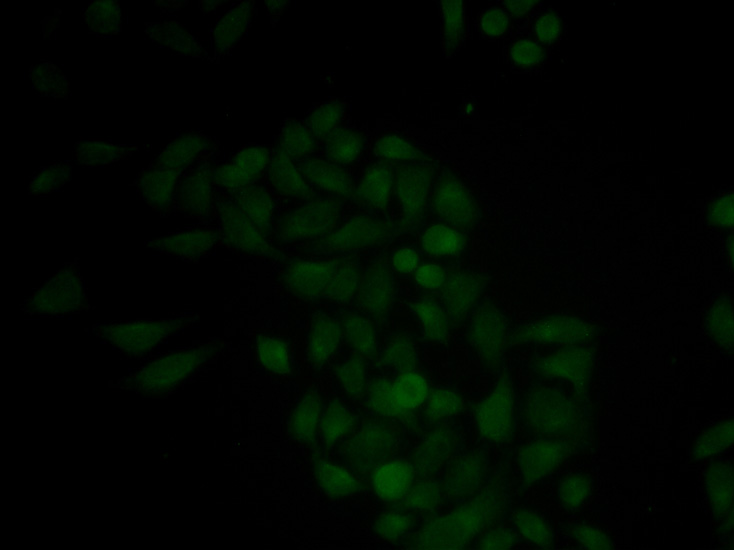Cell Biology Antibodies 8
Anti-CTSE Antibody (CAB2678)
- SKU:
- CAB2678
- Product Type:
- Antibody
- Reactivity:
- Human
- Reactivity:
- Mouse
- Host Species:
- Rabbit
- Isotype:
- IgG
- Research Area:
- Cell Biology
Description
| Antibody Name: | Anti-CTSE Antibody |
| Antibody SKU: | CAB2678 |
| Antibody Size: | 20uL, 50uL, 100uL |
| Application: | WB IHC IF |
| Reactivity: | Human, Mouse |
| Host Species: | Rabbit |
| Immunogen: | Recombinant protein of human CTSE |
| Application: | WB IHC IF |
| Recommended Dilution: | WB 1:500 - 1:2000 IHC 1:50 - 1:200 IF 1:50 - 1:200 |
| Reactivity: | Human, Mouse |
| Positive Samples: | Mouse spleen, Mouse liver, Mouse thymus, Mouse stomach |
| Immunogen: | Recombinant protein of human CTSE |
| Purification Method: | Affinity purification |
| Storage Buffer: | Store at -20'C. Avoid freeze / thaw cycles. Buffer: PBS with 0.02% sodium azide, 50% glycerol, pH7.3. |
| Isotype: | IgG |
| Sequence: | Email for sequence |
| Gene ID: | 1510 |
| Uniprot: | P14091 |
| Cellular Location: | Endosome |
| Calculated MW: | 39kDa/42kDa/43kDa |
| Observed MW: | 43kDa |
| Synonyms: | CTSE, CATE |
| Background: | This gene encodes a member of the A1 family of peptidases. Alternative splicing of this gene results in multiple transcript variants. At least one of these variants encodes a preproprotein that is proteolytically processed to generate the mature enzyme. This enzyme, an aspartic endopeptidase, may be involved in antigen processing and the maturation of secretory proteins. Elevated expression of this gene has been observed in neurodegeneration. |
| UniProt Protein Function: | CTSE: May have a role in immune function. Probably involved in the processing of antigenic peptides during MHC class II-mediated antigen presentation. May play a role in activation-induced lymphocyte depletion in the thymus, and in neuronal degeneration and glial cell activation in the brain. Belongs to the peptidase A1 family. 3 isoforms of the human protein are produced by alternative splicing. |
| UniProt Protein Details: | Protein type:EC 3.4.23.34; Protease Chromosomal Location of Human Ortholog: 1q31 Cellular Component: endosome Molecular Function:protein homodimerization activity; aspartic-type endopeptidase activity Biological Process: protein autoprocessing; digestion; antigen processing and presentation of exogenous peptide antigen via MHC class II; proteolysis |
| NCBI Summary: | The protein encoded by this gene is a gastric aspartyl protease that functions as a disulfide-linked homodimer. This protease, which is a member of the peptidase C1 family, has a specificity similar to that of pepsin A and cathepsin D. It is an intracellular proteinase that does not appear to be involved in the digestion of dietary protein and is found in highest concentration in the surface of epithelial mucus-producing cells of the stomach. It is the first aspartic proteinase expressed in the fetal stomach and is found in more than half of gastric cancers. It appears, therefore, to be an oncofetal antigen. Transcript variants utilizing alternative polyadenylation signals and two transcript variants encoding different isoforms exist for this gene. [provided by RefSeq, Jul 2008] |
| UniProt Code: | P14091 |
| NCBI GenInfo Identifier: | 46397366 |
| NCBI Gene ID: | 1510 |
| NCBI Accession: | P14091.2 |
| UniProt Secondary Accession: | P14091,Q5TZ01, Q5TZ02, Q9NY58, Q9UCE3, Q9UCE4, |
| UniProt Related Accession: | P14091 |
| Molecular Weight: | 396 |
| NCBI Full Name: | Cathepsin E |
| NCBI Synonym Full Names: | cathepsin E |
| NCBI Official Symbol: | CTSE |
| NCBI Official Synonym Symbols: | CATE |
| NCBI Protein Information: | cathepsin E; slow-moving proteinase; erythrocyte membrane aspartic proteinase |
| UniProt Protein Name: | Cathepsin E |
| Protein Family: | Cathepsin |
| UniProt Gene Name: | CTSE |
| UniProt Entry Name: | CATE_HUMAN |
View AllClose


